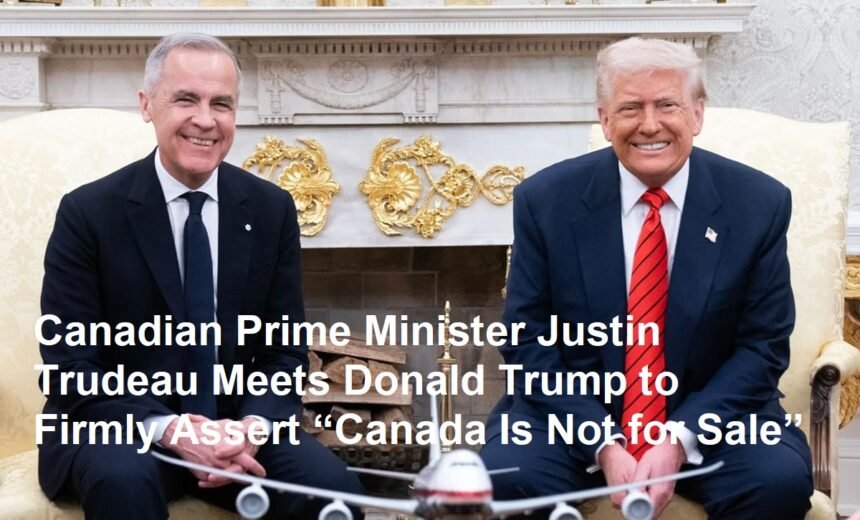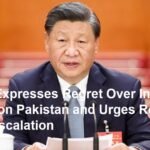On Tuesday, May 6, 2025, Canadian Prime Minister Justin Trudeau held a high-profile meeting with former U.S. President Donald Trump to address growing concerns and rumors suggesting that Canada might be “for sale” amid ongoing trade tensions and geopolitical speculation. The meeting, which took place in Washington, D.C., was marked by Trudeau’s unequivocal message that Canada’s sovereignty and economic independence are non-negotiable, underscoring the country’s firm stance against any notion of being commodified or compromised.
Background and Context
The meeting was prompted by a series of statements and rumors circulating in recent months, fueled in part by Trump’s previous comments on trade and economic relations between the United States and Canada. Trump had, on several occasions, criticized Canadian trade policies and hinted at aggressive economic maneuvers, which some interpreted as suggesting that Canada’s assets or economic interests could be vulnerable to U.S. influence or acquisition.
These remarks sparked widespread concern within Canada and among its allies, raising fears about the country’s ability to maintain control over its natural resources, industries, and national policies. The phrase “Canada is for sale” became a rallying cry among Canadian politicians and citizens alike, symbolizing resistance to perceived external economic pressures.
The Meeting: Trudeau’s Firm Message
During the meeting, Prime Minister Trudeau delivered a clear and firm message to Trump: Canada is sovereign, independent, and not for sale. Trudeau emphasized that Canada’s economic policies are designed to protect its citizens, promote sustainable growth, and maintain fair trade practices. He stressed that any insinuation that Canada could be bought or sold undermines the country’s dignity and the mutual respect that should characterize Canada-U.S. relations.
Trudeau highlighted the importance of a balanced and respectful partnership between the two nations, noting that cooperation and dialogue are essential for addressing shared challenges such as trade disputes, climate change, and security. He reiterated Canada’s commitment to working collaboratively with the United States while safeguarding its own national interests.
Trump’s Response and Dynamics
Donald Trump acknowledged Trudeau’s position during the discussion, recognizing the importance of maintaining strong bilateral ties. While Trump maintained his stance on the need for fair trade and expressed concerns about trade imbalances, he appeared receptive to Trudeau’s insistence on Canadian sovereignty.
The dialogue was described as candid and constructive, with both leaders agreeing on the necessity of continued engagement to resolve outstanding issues. Trump’s willingness to listen to Trudeau’s concerns signaled a potential easing of tensions, although differences on trade policies and economic strategies remain.
Broader Implications for Canada-U.S. Relations
The meeting carries significant implications for the future of Canada-U.S. relations. Trudeau’s firm stance serves as a clear signal to both domestic and international audiences that Canada will not compromise its sovereignty or economic autonomy under external pressure. This message is particularly important given the complex interdependence of the two economies and the ongoing negotiations over trade agreements and tariffs.
By addressing the rumors head-on, Trudeau aimed to reassure Canadian citizens and investors that the government is vigilant in protecting national interests. The meeting also sought to stabilize diplomatic relations by fostering mutual understanding and respect, which are crucial for managing the extensive economic and security ties between the countries.
Economic and Political Context
The backdrop of this meeting includes ongoing trade negotiations, disputes over tariffs on goods such as steel and aluminum, and concerns about foreign investment in critical sectors. Canada’s economy is closely linked to that of the United States, with billions of dollars in cross-border trade and investment flowing annually.
Politically, Trudeau’s assertive message reflects a broader strategy to assert Canadian sovereignty amid a global environment where economic nationalism and protectionism are on the rise. The meeting also underscores the importance of leadership diplomacy in navigating complex international relationships.
Conclusion: A Clear Declaration of Sovereignty
Prime Minister Justin Trudeau’s meeting with Donald Trump on May 6, 2025, stands as a defining moment in reaffirming Canada’s sovereignty and economic independence. By firmly stating that “Canada is not for sale,” Trudeau reinforced the country’s commitment to protecting its national interests while maintaining a cooperative and respectful relationship with its southern neighbor.
This encounter highlights the delicate balance between partnership and autonomy in international relations and sets the tone for future engagements between Canada and the United States. As both countries continue to address shared challenges, Trudeau’s message serves as a reminder that respect for sovereignty is fundamental to enduring and productive bilateral ties.









